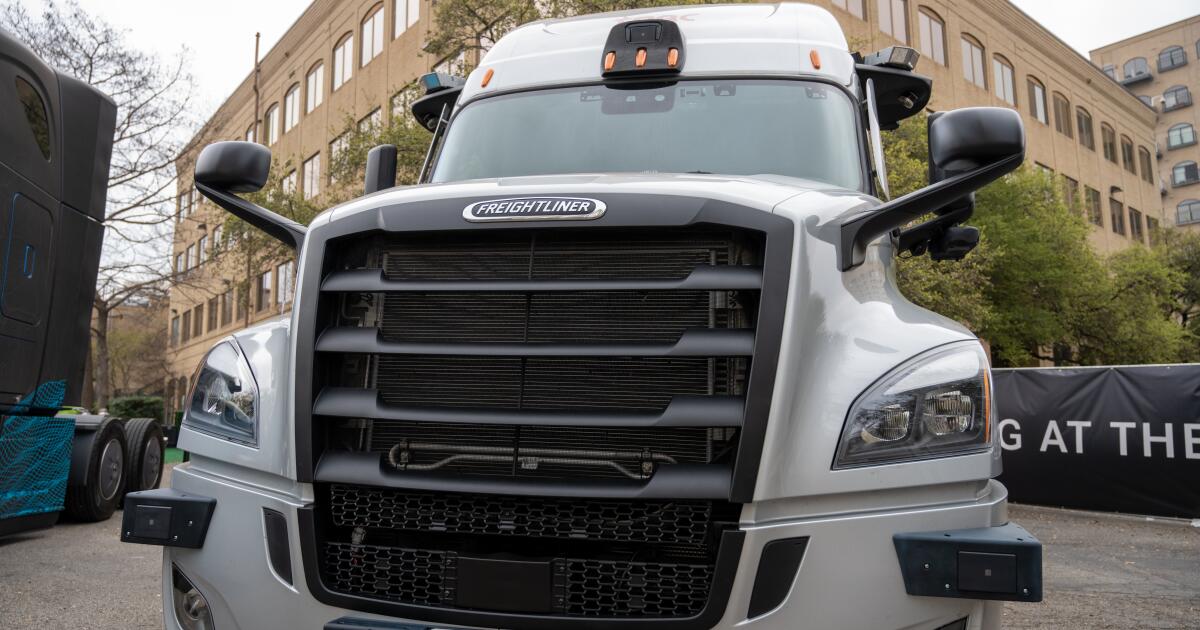Gov. Gavin Newsom is facing a critical decision. The California Senate has just passed a bill that requires human drivers to operate autonomous trucks on state highways for the next five years, citing concerns about safety. However, the governor’s office is more focused on promoting innovation.
The fate of the bill now lies in Newsom’s hands. Although signs point to a veto, it still remains to be seen. Go-Biz, the governor’s California business development office, has written a letter to the bill’s sponsor expressing concerns that the bill would hinder the state’s competitiveness, stifle supply-chain innovation, and undermine existing oversight.
The legislation, known as Assembly Bill 316, received overwhelming support in the Senate with a 36-2 vote. Essentially, it mandates that autonomous trucks, ranging from 10,000 pounds to massive rigs weighing 80,000 pounds, must have a human safety driver on board. This requirement will be in effect for at least five years, although proponents believe it could be removed sooner if there is sufficient confidence in vehicle safety.
Assemblymember Cecilia Aguiar-Curry (D-Winters) sponsored the bill and emphasized the importance of collaborative decision-making involving local elected officials, public safety personnel, and the executive branch to ensure the safety of California travelers and preserve jobs. She expressed her gratitude after Monday’s vote.
The two ‘no’ votes were cast by Sens. Brian Dahle (R-Bieber) and Steve Glazer (D-Orinda). Glazer compared the requirement of human drivers in experimental robot trucks to insisting on using typewriters instead of modern technology.
Opponents argue that the bill is primarily driven by job loss concerns because the Teamsters trucker union strongly supports it. However, proponents insist that the primary goal is to ensure the safe operation of large semi-trucks on state highways.
Safety concerns have escalated following complaints from San Francisco police officers and the city’s fire chief. They reported that driverless taxis deployed by Cruise and Waymo frequently hinder emergency vehicles and first responders. Despite these concerns, both companies obtained approval from the California Public Utilities Commission for expanded commercial operations in the city, potentially due to the fact that all commission members were appointed by Newsom.
John Reynolds, a member of the commission and former top attorney at Cruise, defended his vote, claiming no conflict of interest. However, this incident has drawn attention to the Newsom administration’s handling of driverless car safety regulation, particularly with the California Department of Motor Vehicles (DMV). Although Tesla has been granted permission to test its Full-Self Driving technology on public streets, the DMV argues that the cars are not truly driverless because the drivers are expected to pay attention.
The DMV has been investigating this issue for over two and a half years to determine if Tesla is violating regulations that prohibit marketing autonomous technology when full self-driving is not permitted. During discussions, several legislators expressed their lack of trust in DMV’s oversight of public safety related to robot vehicles.
Newsom, who has a close relationship with Elon Musk as a self-described friend, and ambitiously positioning himself for a potential presidential run in case Joe Biden withdraws, is taking a major gamble by prioritizing autonomous vehicle innovation over public safety.
Denial of responsibility! Vigour Times is an automatic aggregator of Global media. In each content, the hyperlink to the primary source is specified. All trademarks belong to their rightful owners, and all materials to their authors. For any complaint, please reach us at – [email protected]. We will take necessary action within 24 hours.


